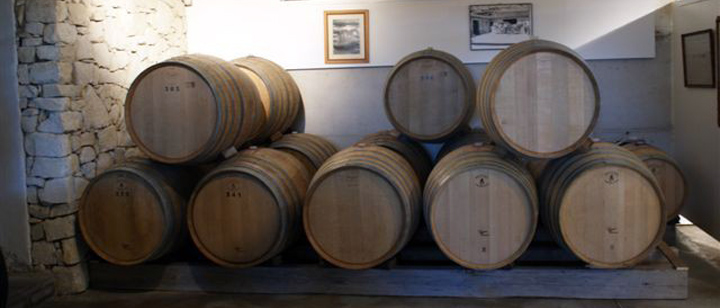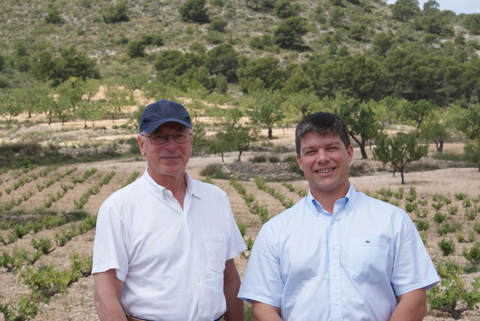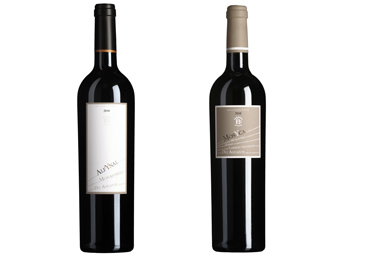
The commitment of the Bruno Prats Winery and Stéphane Point to Monastrell
17 Dic 2014 The commitment of the Bruno Prats Winery and Stéphane Point to Monastrell
In 2009 the Ibérica Bruno Prats Winery set up a promising project to assess the quality of Monastrell vineyards in the Vinalopo district of Alicante and use them to produce hand-crafted, contemporary wines to widen the rich catalogue of a firm that originated in Bordeaux and now has terroirs in various places around the world.
The project surprised us from the very first day. And it continues to do so. The fact is that these professional oenologists from outside the region have brought ideas and methods that contrast starkly with local practice and represent a valuable addition to our technical knowledge.
Stéphane Point is in charge of the wine-making unit. He is an experienced oenologist whose accents reflect his well-travelled career: the classic inflection of the Spanish-speaking Frenchman with Chilean overtones and certain “Spanguese” nuances. He successfully combines this cosmopolitan aspect with an open, affable manner that endows him with an almost palpable charisma. This, coupled with his deep love of wine and his defence of what really is valuable in the Alicante PDO, mean that it is a privilege to interview him for our website.
Together with Bruno Prats, his oenologistic “father”, he has produced two wines in Alicante that have received excellent scores: to put it in plain language, they are delicious. We are also delighted that they have not all been exported and so we can enjoy the small proportion of the vintages that have been released on the domestic market.
– A Frenchman in Alicante: welcome. Actually, there are a lot of French people in the city and this district. Do you feel at home here?
Thanks for the welcome. I don’t know many French people here, but that doesn’t mean there are not a lot. It’s a very hospitable land and foreigners get on well here.
– And how’s life in the Mediterranean?
Good, great! We are living in a unique region due to the climate, the landscape, the people, the diet… we’re lucky to be here!
– And as a winemaker?
I think that’s going well, too. But you’d be better asking those who buy my wines… the quality of life of a winemaker is always good if he has grapes; great if he has good grapes and fantastic if he provides pleasure for those who drink his wines.
– Bruno Prats currently produces wine in several different regions around the world. Where are they and what is he looking for in each?
Bruno Prats has wineries – always with partners – in Chile (Maipo Valley), Portugal (Douro), South Africa (Stellenbosch) and Spain (Alicante). He is always looking to make wines that express the personality and identity of the terroir concerned. We want to produce wines for drinking, without excessive maturation, extraction or ageing in oak. Wines that you will finish once you open the bottle. Elegant, structured, complex wines that are a pure reflection of the terroir. No tricks, just well-made wines from mature grapes.
– What was the main reason why you chose Alicante?
Because of the Monastrell, nothing else. Bruno Prats had the original idea while he was still a student. It is a difficult variety but it has huge potential. The old vines are part of the heritage of the region and we must look after them carefully because they provide very high class grapes. Monastrell wines from the old, rain-fed vines speak to us of the extreme climate of the hinterland: they are profound wines with warm flavours and inimitable freshness. Unique!!! It takes time and patience to get them to reveal their character, and when they are young they need plenty of time to breathe before drinking. But they are wines that continue to evolve in the bottle, and this enables them to take their place in the exclusive group of great wines, not only of Spain but of the world…
– What do you think of the rest of the wines produced in the PDO, your colleagues’ wines?
Things have changed for the better since I arrived in 2009. Today there are a lot of very good quality wines and always very competitively priced – at least when they leave the winery… I think the others have lost their inferiority complex thanks to the efforts of a few local pioneers. The PDO regulating body itself has woken up and will be in agreement bit by bit. Their role is vital for the future. Changes cannot be implemented overnight. It will take patience and intelligence, just like the Monastrell wines.
– Do you think the business situation, the wineries, etc. is very different from what you find in other parts of the world?
Each region is unique, their objectives are different and therefore their situations are different.. Within Spain there are different situations from north to south, for better or worse, but that’s the way countries with a long history of wine-making are: different…
– Currently, where are the main points of sale of your two PDO Alicante wines?
I suppose that when you say ‘points of sale’ you mean the places where the wines are usually bought and consumed? I will cite two shops, VINART in the beautiful Plaza de Miró and BARDISA near the old fish market, and the following four restaurants in Alicante: EL PORTAL, LA TABERNA DEL GOURMET, EL PINTXO KALEA and EL KANOTIER and finally an exceptional restaurant in Xinorlet, RESTAURANTE ELIAS. They are all places where they know very well how to treat the customer and the wine.
– With your broad overall vision of the wine world, would you risk giving a brief summary of the state of wine today?
I don’t feel qualified to make such a statement. A lot of so-called experts try it every day without much success. All I can say is that we have never had such good wines, at least wines without defects (which is a quality!) than we have today. But when I see the fashion for “natural” wines (wines without this, without that…) I get the impression that we have been knocked on the head. Volatile acidity is not synonymous with complexity, but with vinegar. We will have to define things right and stop going to extremes. You can do things very well without being an extremist, but it seems that the extremes are trendy. Because the current state of wine is clearly connected to its quality, or rather its price/quality ratio.
– Describe “Mosyca” and “Alfynal, your two wines”
“Mosyca” is an assemblage mainly of Monastrell, Shiraz and Cabernet Sauvignon. Varieties that do well in the area. They go well together and make a very Mediterranean wine, a pleasurable wine…
“Alfynal” is another adventure. It aspires to represent the Monastrell of the older, rain-fed vineyards with long but discrete ageing in oak. “Alfynal” intends to return the olfactory landscape of the vineyards of our region to the consumer. With its complex structure “Alfynal” is a wine that requires a certain time in the bottle to achieve maturity, but if allowed to breathe properly it can give us pleasure from the very first.
– What do you think distinguishes some specific Alicante wines such as the “añejos”, muscats, “Fondillones”, etc.?
To tell you the truth I don’t consume these products so I’m afraid I can’t express a personal opinion. But there is a market, especially in this Yuletide season. They are very specific products and when they are well made they can provide forceful, memorable sensations.
– At first your wines were intended for export, but we have seen that they have been well-accepted in their home area. What do you think of the conduct of domestic clients and restaurateurs in the case of wines from the Alicante PDO?
Our production is mainly exported to Asia and the USA, but we do sell a little in the area. One problem is that consumers don’t have much confidence in the wines from this area and the restaurateur does not encourage their consumption. Things are changing, but slowly. The measures promoted by the PDO regulating council are promising. The best way is to continue making good Alicante PDO wines and sooner or later the consumer will realize that there is life after Rioja and Ribera del Duero. Mind you, these are areas where they make good wines with excellent reputations, so we shouldn’t drop our shoulders but raise our arms high in the air with a glass of Alicante wine in each hand!!!
– Do you have plans for the future in the area? New wines, new partnerships?
These are still early days for the project. I can’t tell you whether we’ll stay or not… anyone who knows the world of wine knows that five years is nothing. Just as it will with the great Monastrell wines, the future will tell.
Thanks, greetings to all and may you drink great wines during the end-of-year festivities. CHEERS!!


